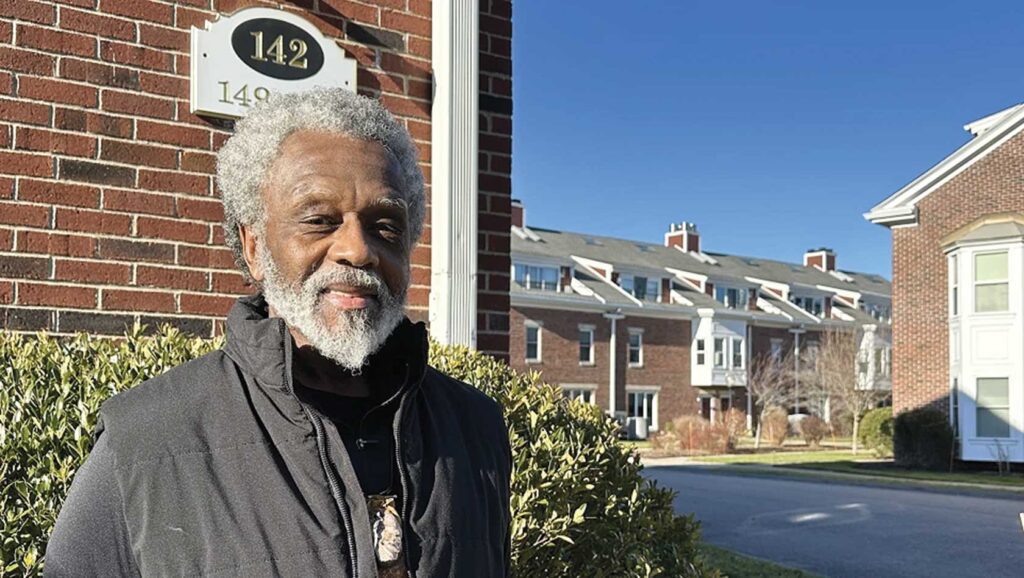
Harold Adams spent more than half a century in the state’s criminal justice system — 31 years in state prison and another 22 years out on parole in the community.
He spent those two decades checking in with a parole officer at least once a month, restricted from free travel, wary of random searches and, until recently, paying $85 a month in monthly parole fees. Some people in his situation spend the rest of their lives on parole.
But in October, Adams received the good news that his parole had finally been terminated.
“It didn’t sink in immediately,” Adams told GBH News in a recent interview. “It was sort of surreal. Thinking in terms of the things that I can now do.”
Adams is one of 13 formerly incarcerated people who had their parole terminated in 2023 by the Massachusetts Parole Board, according to state data obtained by GBH News Center for Investigative Reporting. This is a dramatic increase in the state where only one person received a parole termination since 2018, according to state data.
While still a small number in proportion to the estimated 1,350 people currently on parole, prisoners and their advocates say the change is significant. Attorney Jeffrey Harris, who represents clients on parole, says the difference is “night and day.” He said more people need to know it’s even an option.
“Ideally, there would be some mechanism outside the parole board that would notify people who have been doing well and have been on parole for 20, 25, 30 years, that this is a real possibility,” he said.
The state’s parole system has long been considered problematic, including concerns about long waits to release people after they’ve been approved for parole, putting people back in prison for minor violations and keeping people like Adams on parole for decades. Under their conditional freedom, former prisoners have to live up to a set of rules, often tailored to them and their crime. Parole supervision generally ends when a former prisoner’s set term ends, or in rare circumstances, through parole termination.
New York, California and New Jersey are among a handful of states that allow parolees to petition to end their parole supervision.
In Massachusetts, a public hearing was held on the opaque process, and the state issued new rules to terminate parole in December 2022, after GBH News reported on a lawsuit brought by parolees claiming termination applications were rarely approved.
That lawsuit has since been suspended to give the state time to work under the new guidelines.
Timothy McGuirk, a spokesperson for the state parole board, told GBH News that the changes were meant “to ensure members can thoroughly review petitions and determine the appropriate level of supervision in every case.”
“These decisions require thoughtful consideration, and the Board members have used their expertise to make terminations that align with public safety interests,” he said.
The changes come as the makeup of the parole board is shifting with several new nominations by Democratic Gov. Maura Healey. Tina M. Hurley, a former parole officer, was elected chair in 2022, and some attorneys point to her leadership as one of the reasons why the atmosphere of the board has become more considerate of parolees.
“I think the chair of the board, Tina Hurley, has a very different attitude towards parole and people on parole than some board members in the past,” said James Pingeon, litigation director for Prisoners’ Legal Services, which helped litigate the recent lawsuit. “I think she has a sincere interest in using parole as a way of reintegrating people into society.”
In 2023, the board considered 58 applications for termination and approved 13, about 22% of all requests, state data shows.
Khalid Mustafa, 65, says he too is one of the fortunate recipients of a termination.

Khalid Mustafa poses for a photo in Boston’s Franklin Park on Feb. 21, 2022. PHOTO: MEREDITH NIERMAN GBH NEWS
Mustafa, whose story was featured in GBH News last March, says he had his parole terminated this month after 33 years living on community supervision in Boston. He says his November parole hearing was attended by more than 50 in-person and virtual supporters.
Mustafa said that, when his parole officer called, he “didn’t believe it” until he saw the certificate in an email. Even then, he read it “three or four times” to see if he understood.
“That’s a very freeing kind of excitement,” he said. “I’m still trying to wrestle with it.”
Under the new rules, to win a petition, parolees have to meet certain requirements, including completing a year of “satisfactory” parole supervision, and being assessed as a “low risk.” They can’t have any written warnings, parole violations or warrants in the past year. And their request goes through their parole officer and supervisor — although the final decision is with the parole board.
Those who ended up disappointed include Rich Johnston, who has been living on parole for 22 years. Johnston, age 67, was first paroled in 1991, but soon returned to prison for 10 years for drug charges and driving under the influence. Since 2001, he says he has attended Alcoholics Anonymous meetings and has seen a parole officer at least once a month. He estimates he has paid close to $20,000 in parolee fees — a monthly financial burden for parolees that the state eliminated last year.
Johnston said he wanted to ask for a parole termination in the past, but his parole officer thought it might be a waste of time because the board wasn’t issuing terminations often. Johnston said he read the GBH News story featuring Mustafa last year and decided to apply in June. He was granted a hearing last spring and was denied in May. Johnston said he was disappointed that the parole board focused so much on his crime and less on his successes living on community supervision — but believes he could have done a better job telling his story.
He intends to reapply next year — next time, with a longer letter citing his successes and work in the community as well as the 20 letters of support he already has collected. Johnston says he is cognizant of the crime he committed as an 18-year-old, something he can’t undo.
“Every time I see the parole officer, every time I’m reminded — it’s emotional. It reminds me of the gravity and also the fact that I committed a horrible crime,” he said.
Several prisoners’ advocates say more needs to be done to help parolees understand their rights to apply for a termination. Pingeon at Prisoners’ Legal Services said there’s currently no application form, nor is the process detailed in the handbook that prisoners receive upon release.
“That should be a carrot that is offered to people [to] give them some kind of light at the end of the tunnel,” Pingeon said.
Adams, 76, says he’s still trying to understand how his life will change now that he is finally released from the obligations of living on parole. He says his heart condition will likely keep him close to home in Quincy. But he’s hoping to visit friends in Cape Verde someday.
He’s grateful for what he
believes — that new members of the board have a different way of looking at parolees.
“I’m planning on writing them a letter, first of all, thanking them for terminating me and telling them that I’m willing to act in any capacity that will be helpful in keeping this positive mindset and this positive trend going,” he said.
Sarah Betancourt is a reporter for GBH News Center for Investigative Reporting.






